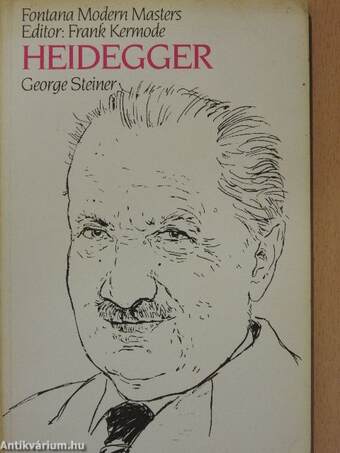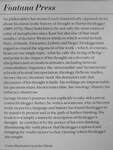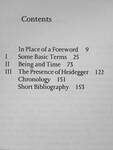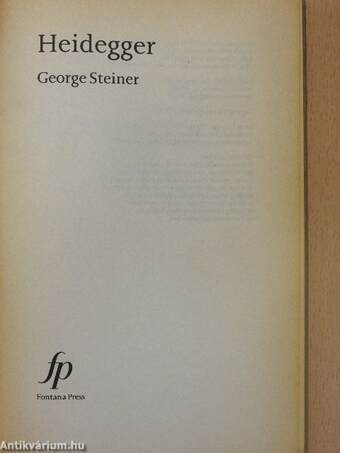1.076.527
kiadvánnyal nyújtjuk Magyarország legnagyobb antikvár könyv-kínálatát

VISSZA
A TETEJÉRE
JAVASLATOKÉszre-
vételek
Heidegger
| Kiadó: | Fontana Press |
|---|---|
| Kiadás helye: | London |
| Kiadás éve: | |
| Kötés típusa: | Ragasztott papírkötés |
| Oldalszám: | 158 oldal |
| Sorozatcím: | Fontana Modern Masters |
| Kötetszám: | |
| Nyelv: | Angol |
| Méret: | 20 cm x 13 cm |
| ISBN: | 0-00-686142-3 |
naponta értesítjük a beérkező friss
kiadványokról
naponta értesítjük a beérkező friss
kiadványokról
Fülszöveg
Fontana Press
No philosopher has aroused such diametrically opposed views
about his status in the history of thought as Martin Heidegger
(1889-1976). Many hold him to be not only the most eminent
critic of metaphysics since Kant but also one of that small
number of decisive Western thinkers which would include
Plato, Aristotle, Descartes, Leibniz and Hegel. Heideggerians
regard as crucial the argument of his work - which, in essence,
bears on one single topic: what he calls 'the being of Being'-
and point to the impact of his thought on a diversity of
disciplines and on modern attitudes, including Sartrean
existentialism, linguistics, the 'structuralist' and 'hermeneutic'
schools of textual interpretation, theology, Hellenic studies,
literary theory, literature itself. His detractors rule that
discussion of his thought is futile : his writings are impenetrable,
his questions sham, his doctrines false, his 'ontology' illusory his
influence disastrous.
George... Tovább
Fülszöveg
Fontana Press
No philosopher has aroused such diametrically opposed views
about his status in the history of thought as Martin Heidegger
(1889-1976). Many hold him to be not only the most eminent
critic of metaphysics since Kant but also one of that small
number of decisive Western thinkers which would include
Plato, Aristotle, Descartes, Leibniz and Hegel. Heideggerians
regard as crucial the argument of his work - which, in essence,
bears on one single topic: what he calls 'the being of Being'-
and point to the impact of his thought on a diversity of
disciplines and on modern attitudes, including Sartrean
existentialism, linguistics, the 'structuralist' and 'hermeneutic'
schools of textual interpretation, theology, Hellenic studies,
literary theory, literature itself. His detractors rule that
discussion of his thought is futile : his writings are impenetrable,
his questions sham, his doctrines false, his 'ontology' illusory his
influence disastrous.
George Steiner's purpose is not explicitly to take sides pro or
contra Heidegger. Rather, he writes as someone who in his own
work on poetics, language and history has found Heidegger to
be massively present and in the path of further thinking. His
book is not simply a masterly description of Heidegger's
thought: he enriches it by the power of his own thinking,
illuminating the 'unlit places' that Heidegger explored and
bringing the reader nearer to that 'clearing' which Heidegger
also sought.
Cover illustration byJohn Ihirsk Vissza
Témakörök
- Filozófia > Témaköre szerint > Ontológia (Lételmélet) > Egzisztenciálontológia
- Filozófia > Témaköre szerint > Tanulmányok, esszék
- Filozófia > Témaköre szerint > Filozófiatörténet > Irányzatok
- Idegennyelv > Idegennyelvű könyvek > Angol > Filozófia > Témaköre szerint > Tanulmányok, esszék
- Idegennyelv > Idegennyelvű könyvek > Angol > Filozófia > Témaköre szerint > Filozófiatörténet > Irányzatok
- Idegennyelv > Idegennyelvű könyvek > Angol > Filozófia > Témaköre szerint > Ontológia (Lételmélet) > Egzisztenciálontológia
George Steiner
George Steiner műveinek az Antikvarium.hu-n kapható vagy előjegyezhető listáját itt tekintheti meg: George Steiner könyvek, művekMegvásárolható példányok
Nincs megvásárolható példány
A könyv összes megrendelhető példánya elfogyott. Ha kívánja, előjegyezheti a könyvet, és amint a könyv egy újabb példánya elérhető lesz, értesítjük.







